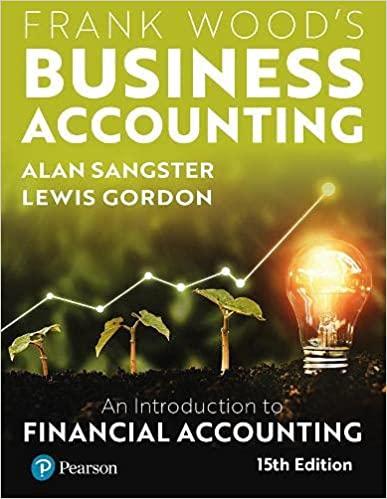Michael Baldwin owns B's Casuals, a company specialising in low-quality, high-priced clothing. The material is purchased from
Question:
Michael Baldwin owns B's Casuals, a company specialising in low-quality, high-priced clothing. The material is purchased from Canada, made up into the finished garments in his own factory, and then sold in the local markets through stallholders.
During the year ended 30 June 2023 Baldwin had sales of \(£ 260,040\).
Inventory levels have remained relatively consistent over the years, the starting inventory being \(£ 21,500\) and the closing inventory \(£ 22,500\).
Baldwin is not very generous to his staff. This is reflected in the wages paid during the year of only \(£ 24,500\).
Business rates are a problem, since there is a dispute with the local council. He has paid a total of \(£ 7,500\) but there is a good chance that he will have to pay a further \(£ 2,450\).
Postage and advertising is another problem area. For the imports from Canada it is necessary to pay all of the flight costs. These amounted to \(£ 5,200\) over the year.
He delivers all of his invoices to the stallholders in person and is paid promptly, with the exception of one debtor who owes \(£ 2,000\) and who has been declared bankrupt. This amount is to be written off.
Advertising is minimal and is done in the local pub: \(£ 20\) per week is paid to the landlord in return for permission to pin leaflets on the walls and an agreement that the landlord will place a leaflet every day on each table in the bar.
Insurance of \(£ 3,500\) has been paid, but \(£ 650\) of this relates to the year ending 30 June 2024 .
Electricity bills amounted to \(£ 2,900\), but the bill for the final quarter is still outstanding and is expected to be approximately \(£ 500\). Purchases of cloth from Canada for the year are currently recorded as being \(£ 65,000\), but there is an outstanding bill of \(£ 3,500\) which is not yet included in that figure.
The factory and the machinery were bought at the same time and originally cost \(£ 400,000\). Depreciation has accumulated to the sum of \(£ 100,000\). The current year charge is 5 per cent on the reducing balance basis.
The business had a computer which was purchased about three years ago and which Michael reckons has about another two years of life left. It cost \(£ 4,000\) and Baldwin uses the straight line method of calculating the depreciation charge. The computer will be worthless at the end of that time.
Stationery charges amounted to \(£ 1,350\) and he had telephone bills of \(£ 3,500, \ldots 200\) of which relates to July and August 2023. In the year ending 30 June 2023, he had paid \(£ 150\) which related to telephone charges in the year ending 30 June 2023.
Baldwin has also paid \(£ 5,000\) for a top-of-the-range digital home cinema system. He has enquired as to whether he can class this as a business expense as it has enabled him to unwind after long days at the office.
His salary for the year was \(£ 50,000\).
Cash in hand at 30 June 2023 was \(£ 600\) which he borrowed from his wife temporarily on 30 June when he realised that there was no cash available to pay any expenses.
\section*{Required}
(a) Prepare an income statement for the year ending 30 June 2023.
(b) Prepare a balance sheet as at 30 June 2023 showing clearly Mr Baldwin's opening capital, net assets and the profit for the year.
(c) Baldwin has enquired why he should include the amounts owing to both the council and the Canadians in the current year's financial statements and also why he cannot include his own wages within expenses since they have been paid out from the business. Write a letter to Baldwin explaining these points and answering his query concerning the home cinema system.
Step by Step Answer:

Frank Woods Business Accounting An Introduction To Financial Accounting
ISBN: 9781292365435
15th Edition
Authors: Alan Sangster, Lewis Gordon, Frank Wood





